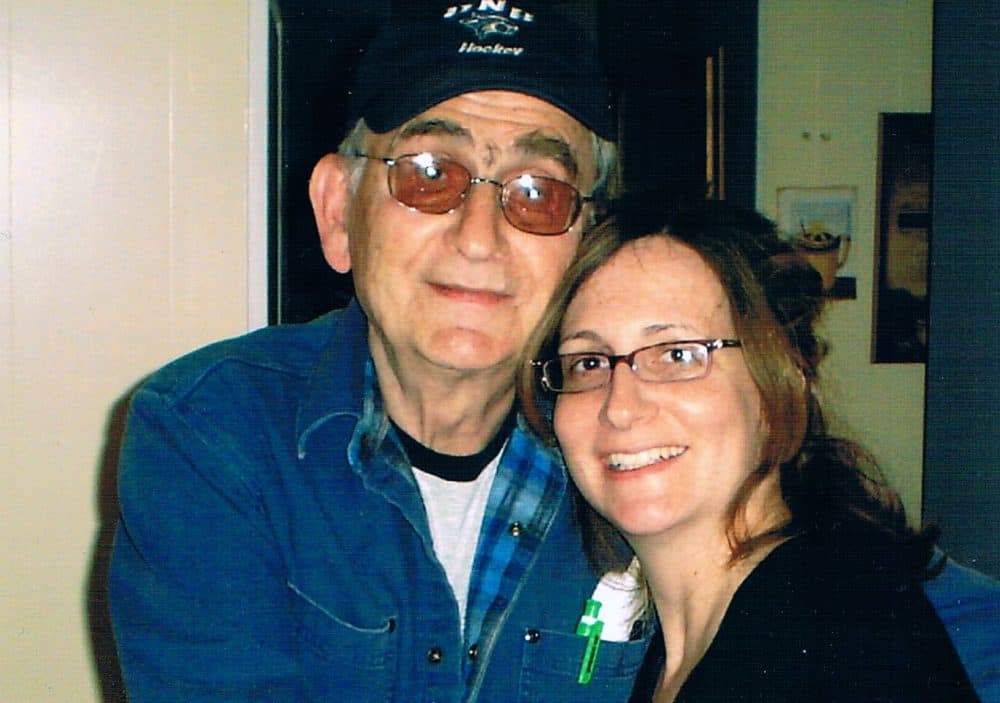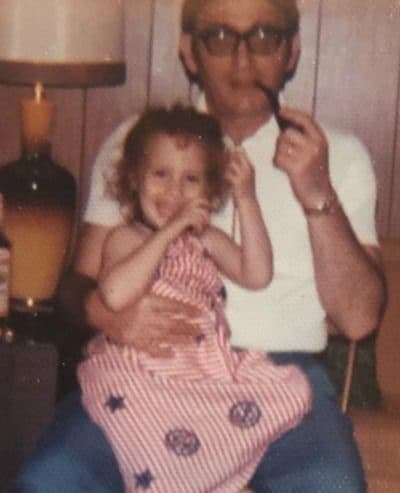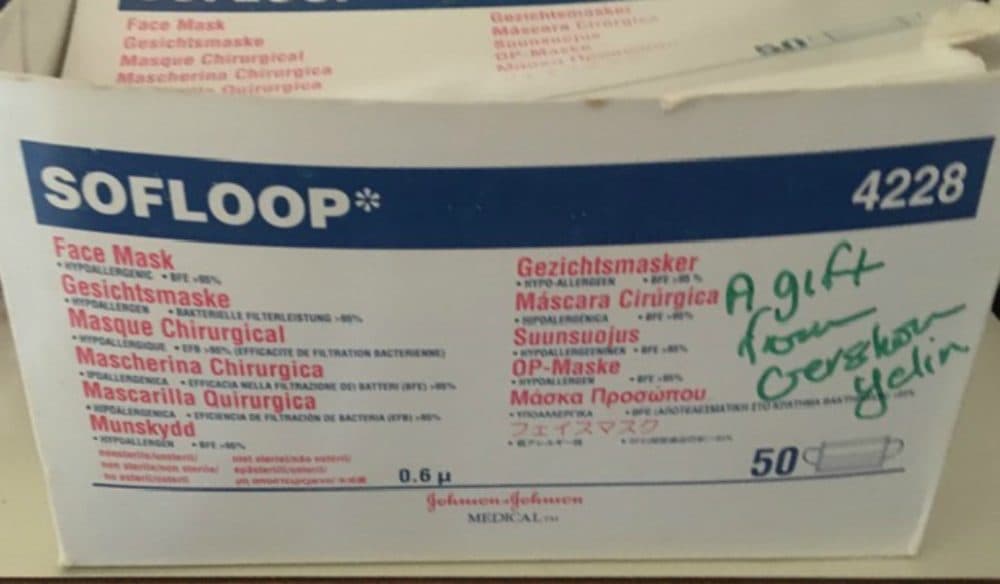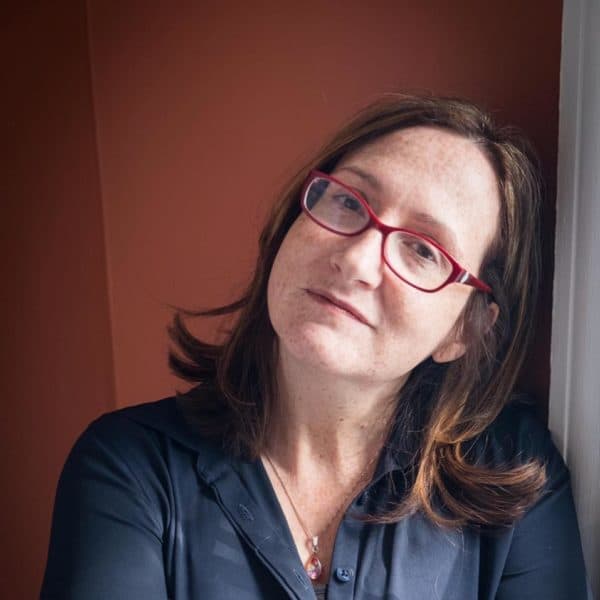Advertisement
Commentary
A Forgotten Box Of Masks, Once 'Just A Precaution,' Now Feels Like A Sign From My Dad

My husband, Ben, found the stash of hospital masks. They were in a small box in a cupboard above the refrigerator — a place I never visited or even remembered existed, as I am too short to reach anything there anyway. When he pulled them out of their hiding place, my jaw dropped. It was like a coronavirus miracle!
“Where did those come from?”
“Your dad gave these to us years ago,” Ben said. “It was during the SARS epidemic.”
I suddenly had a vague memory of my dad at the old house in New York where I grew up. Ben and I were getting ready to drive back to Newburyport, Massachusetts, where we lived at the time. My father made us wait while he went upstairs, saying, “I have something to give you.” He came down with the box of 50 masks, which he put in a plastic bag for us to take home.
“Just a precaution,” he said, before we kissed on the cheek and said our goodbyes.
At the time I was 32 or 33 — sans kids, and I likely still considered myself invincible. I don’t remember being scared about SARS. Nor do I recall Ben or I ever using the masks. Instead, Ben tucked them away somewhere until it was time for their next journey, to a new apartment in Cambridge, and then one more move to our condo in Arlington, where they disappeared in our kitchen cabinet.

It’s no surprise to me that my dad had easy access to such masks, as he was a doctor — a psychiatrist, though he’d trained first as a general practitioner. As I child, I believed my father could cure whatever ailed me with just the right fruity-flavored medicine. When I left for college, I knew if I got sick, I could always count on him to overnight me the potent stuff — the antibiotics — and everything would be all right.
I last saw my 91-year-old father in November of 2019, when my sisters and I flew to North Carolina to say our goodbyes.
He was doing hospice at home, with his second wife. It was a bittersweet visit, of course, as anyone who has watched a loved one dying knows. We sang his favorite songs from “Fiddler on the Roof” and attempted to conjure up old memories with photos. We held his hand. But eventually, I had to go home, back to my husband and kids.
Several weeks later, on January 8, I got the call that my father had died.
I’ve believed in “signs” for a long time. On the day my mother died of ovarian cancer in 2002, I remember the birds were louder than I’d ever heard them. That same morning, I also found my father and my sisters wiping up some black fluid leaking from underneath the ancient green refrigerator, which had also just died. I became obsessed with the timing of those events. That they meant something.
Now, 18 years later, I’m doing it again: with these masks from my father. My family and I needed them to stay safe. And like magic, my father had provided them.
On a Zoom call with friends recently, I couldn’t help gushing about the sudden appearance of my miracle masks. I explained that they were a gift from the beyond, from my dad! That he was looking out for his family even in death. I felt a sense of peace, of calm, knowing that we had them.
My stomach dropped. I like to think of myself as a giving person. But I was scared.
About 30 minutes later, I received a text message from my friend, Dr. Robin, who had been on that call:
I have a desperate young woman from a hospital who is working the next seven nights in their ICU. She would love your masks.
My stomach dropped. I like to think of myself as a giving person. But I was scared. My family and I needed these masks. A part of me was crying inside mine mine mine! And I was still stuck on believing they were a sign from my dad. I didn’t want to let go.
So I ignored her text for about 24 hours.
In between, I tortured myself, debating what to do.
Why should I share them?
I shouldn’t have to.
He’d given them to me.
(But you can help someone.)
But we need them to stay safe.
(REPEAT.)
In the end, before I eventually fell asleep, I asked myself: What would my father do?
As a child, I remember the cardboard box of food donations my father left for his patients outside his office door. I remember him donating our old furniture to them as well. What I hadn’t known, however, was something that his second wife contributed to the obituary we wrote together just a few months ago. It stopped me cold:
Over his 50-year career, Dr. Yelin treated patients from all walks of life regardless of their ability to pay. When managed care took hold in the 1980s, he vehemently opposed “for-profit” medicine. In his view, "treating the sick should not become a 'for-profit' business...patient care will suffer." He treated managed care patients free of charge until he retired in 2009.
Let me be clear: I don’t want to glorify my dad. He wasn’t perfect. He could be moody and roll his eyes at you, sighing loudly. When my 14- year-old self sat down with him for breakfast, before school, he’d often turn up the volume on 1010 WINS News Radio as he drank his coffee. Other times, he’d just get up and leave. But there was another side to him too — a lovable side. A funny side. A caring side. A pancake-making side. People are rarely just one thing.
In the end, I donated the masks. And I made the most of the moment.
I walked to Dr. Robin’s house, while taking in the trees and the sky and a bubbling brook, and staying six feet away from any other humans. I left the box of masks on a chair outside her house, pausing briefly to take a photo of the corner of the box where I’d written, “A gift from Gershon Yelin.”

